News & Announcements
- Details
- Written by Laura Mirsky
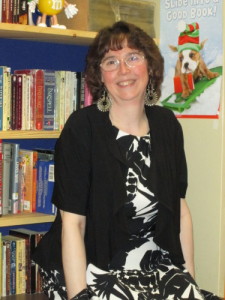 Language Arts teacher Heidi Fisher employs the Restorative Questions in circle discussions, encouraging students to relate to their reading assignments.
Language Arts teacher Heidi Fisher employs the Restorative Questions in circle discussions, encouraging students to relate to their reading assignments.
Heidi began implementing restorative practices in her classroom at Indian River Middle School, in Canaan, New Hampshire, the day she returned from an IIRP Basic Restorative Practices event, in Bethlehem, PA.
Her students had behaved poorly with the substitute teacher while she was away, so she decided to try the Restorative Questions to address the issue. “It was incredible just to listen to their responses to the questions,” notes Heidi. “They all acknowledged that they should have behaved better, and they apologized to the substitute.”
- Details
- Written by Joshua Wachtel
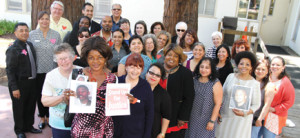 Participants in the San Francisco Archdiocese Restorative Justice Ministry's homicide survivors assistance and support retreat (Photo by Christina Gray/Catholic San Francisco)
Participants in the San Francisco Archdiocese Restorative Justice Ministry's homicide survivors assistance and support retreat (Photo by Christina Gray/Catholic San Francisco)
The Catholic Archdiocese of San Francisco Restorative Justice Ministry recently hosted a retreat for nearly 40 survivors of homicide and representatives of organizations that support them. The retreat included Restorative Responses to Adversity and Trauma, a professional development event conducted by the International Institute for Restorative Practices. The event gave participants a deeper understanding of their own trauma and loss as well as skills to help themselves and others cope with similar experiences.
“The most amazing thing was getting people to the leadership moment, where they can actually begin to see their healing on a higher and deeper level, as well as some restoration as a step in their healing process,” affirms Julio Escobar, director of the Restorative Justice Ministry. “We wanted to introduce the concept of restorative justice and restorative practices from an accredited organization like the IIRP,” he explains.
- Details
- Written by Joshua Wachtel
Schools
The American Federation of Teachers — one of the nation’s largest unions — takes on the issue of racial justice using restorative practices.
Daniel Losen, director of Center for Civil Rights Remedies at the University of California, Los Angeles, discusses "Practices that create accountable and restorative discipline" during an in-depth multi-part interview with Engaging Schools.
- Details
- Written by Joshua Wachtel
Rhonda Richetta, principal of City Springs Elementary/Middle School, in Baltimore, Maryland, talks to SaferSanerSchools Instructor Steve Korr about the many ways restorative practices has benefited her school and life and tells some great stories.
- Details
- Written by Laura Mirsky
“Good riddance to zero tolerance!” declared IIRP president John Bailie, Ph.D., opening the IIRP Symposium: Integrating School Climate Reform Efforts. At that, about 150 educators from across North America — superintendents, school climate and safety administrators, teachers, counselors and psychologists — cheered their approval.
They had come, along with a panel of six school climate reform leaders, to Bethlehem, PA, July 20-21, 2015, to explore how the wide array of programs created to replace zero tolerance could work together.
- Details
- Written by Joshua Wachtel
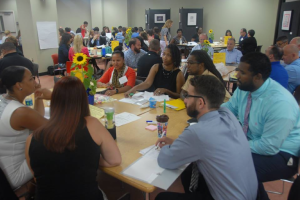 This school year, Pittsburgh, PA, Public Schools (PPS) are set to launch the largest restorative practices Whole-School Change program ever undertaken, with 22 elementary, middle and high schools participating.
This school year, Pittsburgh, PA, Public Schools (PPS) are set to launch the largest restorative practices Whole-School Change program ever undertaken, with 22 elementary, middle and high schools participating.
The U.S. Department of Justice has provided $3 million of funding for the district’s Pursuing Equitable Restorative Communities (PERC) project. The grant will pay to implement the International Institute for Restorative Practices (IIRP) SaferSanerSchools Whole-School Change program, a comprehensive two-year school implementation model. It will also provide for the RAND Corporation to measure the effectiveness of restorative practices in the 22-school "treatment group" against a "control group" of 22 other schools in PPS that will not participate in the program.
- Details
- Written by Joshua Wachtel
Schools
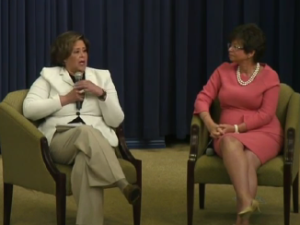 The US Department of Education launched its #RethinkDiscipline Campaign with an all-day kickoff on July 22. LA Unified School District's restorative justice efforts win White House applause. Rochester, NY, School District Superintendent Bolgen Vargas visited the White House to discuss restorative practices in school discipline.
The US Department of Education launched its #RethinkDiscipline Campaign with an all-day kickoff on July 22. LA Unified School District's restorative justice efforts win White House applause. Rochester, NY, School District Superintendent Bolgen Vargas visited the White House to discuss restorative practices in school discipline.
Education Week’s Research Center issued a new report, "Social and emotional learning: Perspectives from America's schools," which shows, among other things, "a particularly large expansion in the use of restorative practices" over the past three years.
An EdWeek article by Evie Blad suggests, "Urban Districts Embrace Social-Emotional Learning." Plus, a New York Times Op Ed piece by David Bornstein argues that "Teaching Social Skills Improve Grades and Lives."
ASCD (the Association for Supervision and Curriculum Development) sees similarities and a need for connection between "whole child, social & emotional learning (SEL), character education and school climate."
- Details
- Written by Laura Mirsky
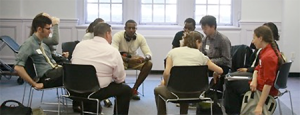 College and high school students showed up to make their voices heard at a conference on restorative practices for New York City schools, in the Bronx, NY. Why? The students are hungry for learning. Mostly from disadvantaged backgrounds, they see their education as a way to liberty and freedom.
College and high school students showed up to make their voices heard at a conference on restorative practices for New York City schools, in the Bronx, NY. Why? The students are hungry for learning. Mostly from disadvantaged backgrounds, they see their education as a way to liberty and freedom.
The college students were invited to “Transformative Practices & Restorative Justice Conference: A Celebration and Call to Action,” by their education professor at Lehman College, City University of New York (CUNY), David Fletcher, Ed.D. Together with 250 educators, school administrators and community representatives, Fletcher is building a community to implement restorative practices in NYC schools.
- Details
- Written by Joshua Wachtel
Students and teachers from Maine schools that are implementing the SaferSanerSchools Whole-School Change program as part of a 5-year RAND study speak about the positive impact in the classroom of circles and other informal restorative practices. These practices give everyone a chance to be heard.
- Details
- Written by Joshua Wachtel
 The borderlands of Pakistan and Afghanistan are a dangerous and violent place. But it is here that a student of restorative justice, Ali Gohar, founder of Just Peace Initiatives, based in Peshawar, Pakistan, has worked to reinvigorate and reinvent traditional conflict resolution practices.
The borderlands of Pakistan and Afghanistan are a dangerous and violent place. But it is here that a student of restorative justice, Ali Gohar, founder of Just Peace Initiatives, based in Peshawar, Pakistan, has worked to reinvigorate and reinvent traditional conflict resolution practices.
In this tribal region, inhabited largely by ethnic Pukhtoon, wrongdoing can spiral into cycles of vengeance. Family feuds can last for generations. For instance, nearly 60 years after the event, a man avenged his father’s murder by in turn killing the original murderer’s grandson. Revenge killings continued back and forth between the two families until a total of a dozen people were dead. Without the intervention of the jirga – a tribal council “organized by wise, respectable, greybeard elders whose decision is unanimous, acceptable to all community members” (Gohar, n.d.) – the cycle of violence would have continued. The jirga sent representatives to each family and convinced them to end the feud “for the sake of God” with no blood money exchanging hands (Lofton, 2015).

Restorative Works Year in Review 2024 (PDF)
All our donors are acknowledged annually in Restorative Works.
